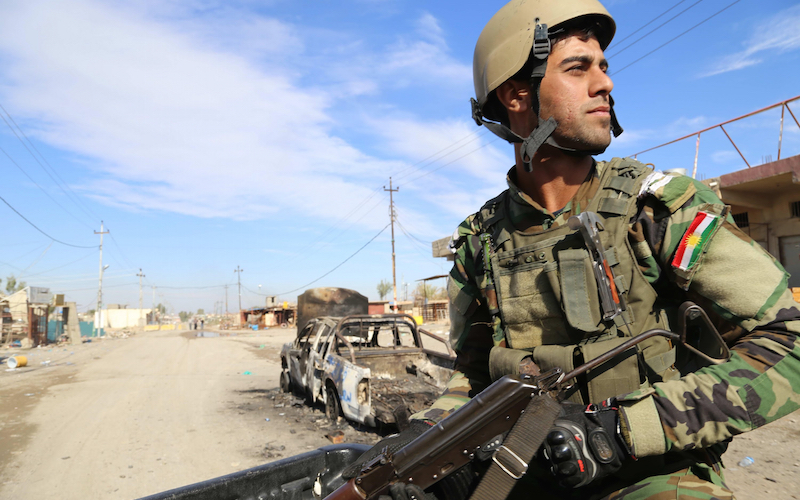
U.S. Foreign Policy Regarding the Self-Styled Islamic State
The atrocities committed by members of the self-styled Islamic State have been a recurring topic in global news for the past year, and people are looking to their governments for a response to these horrific acts. As for the United States, not just Americans but people around the world are wondering how Washington will react. Thus far the U.S. government has been cautious when it comes to interfering with events in the Middle East. Uncertainty of the war’s outcome has caused government officials to hesitate on entering the fight, but the terrorist acts of IS, both inside and outside their claimed territory, have become too egregious to ignore. It is now obvious that the U.S. must take action. It seems clear that the most successful way to combat IS is through efforts to secure the Turkish border, by aiding the Kurdish Peshmerga and Iraqi army, and by continuing air strikes, as they have proved to be successful.
Much of the territory IS controls borders Turkey, whose weak and porous defense system allows people and goods to be easily smuggled through the region. This weakness enables IS to earn income from selling oil. Barrels produced from the oil fields IS now controls are smuggled across the Turkish border. It is estimated that more than 50,000 barrels of oil are being produced per day, which translates into IS earning about 2 million dollars or more per day from this oil.
Because of this, IS is now close to being worth 2 billion dollars. Securing the Turkish border would strip IS of this revenue source, without which they could no longer buy the advanced weapons that give them an advantage over the Iraqi army.
In addition to the oil, people also cross this border to join the Islamic State. By projecting an image of success and wealth, ISIL has attracted numerous foreign fighters who left their home countries and, in some circumstances, traveled halfway around the world to join this group.
It is said that some 20,000 foreign fighters have traveled to join IS’s ranks so far, many of whom have come by way of the Turkish border. Though security precautions have been put in place by foreign governments, Turkey remains the most common entry point to IS-controlled territory. According to CIA, the Islamic State was already 30,000 strong towards the end of 2014 and the large number of foreign supporters continue to increase IS’s power. As Alessandria Masi of International Business Times suggests, “foreign recruits are the lifeblood of ISIS.”
So far the United States government has been cautious in combating IS, focusing on aiding opposition forces and conducting limited airstrikes that began in September of 2014. These airstrikes have proven to be successful in halting the advance of IS forces and in some cases, forcing a retreat. Other successful efforts include those of the Kurdish Peshmerga. “They have the best track record of defeating the militants” stated Holly Williams of CBS. An example of this was Peshmerga troops retaking the towns, Makhmur and Gwer, in Iraq back from the Islamic State in August of 2014.
Since December the Peshmerga have regained 1,500 square miles from IS. The Kurds are in need of supplies, but the United States has been slow to send aid. Out of the hundreds of armored military vehicles requested by the Peshmerga, the U.S. has sent 25. Based on their victories so far, if well supplied the Kurds are predicted to be the most successful in pushing back IS and, with the help of the Iraqi army and US air power, they could force IS out of Iraq.
A recent poll conducted by the University of Maryland shows 57% of the American public believes that the US should do whatever is necessary to stop the Islamic State. There are three main reasons those surveyed support US action: humanitarian efforts, threat of terrorism, and strategic gain. That said, only 41% of the American public favor the deployment of US ground troops while 57% are against putting U.S. soldiers in the Middle East. So even if the US avoids ground troops and continues only with air strikes, IS still has access to its power source. If Peshmerga or Iraqi troops fought IS or Islamic State camps were destroyed by U.S. airstrikes, there would still be a flow of foreign fighters and money to help them resupply.
But if the U.S. sent aid in the form of weapons, military advisors, and special ops groups to join with the Kurdish Peshmerga and the Iraqi army, full combat situations could be avoided and the fighters in this area already proven successful in combating IS would be better armed and supported. Additionally, if the Turkish border was better secured, the escape and resupply valve of IS would be cut off. This would keep IS from being resupplied with foreign fighters, exporting oil, and being resupplied with more weapons. Weakening IS this way gives the Kurdish Peshmerga and the Iraqi army a much better chance of stopping IS and regaining previously taken territory.
There is little disagreement among Americans over whether or not the U.S. should intervene in the Middle East, the real question is how. By focusing on these three options, the U.S. is likely to find much greater success in combating the Islamic State.

